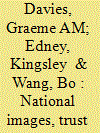| Srl | Item |
| 1 |
ID:
131349


|
|
|
|
|
| Publication |
2014.
|
| Summary/Abstract |
Amid growing alarm over the rising atmospheric concentration of greenhouse gases, increasing attention is being given to 'geo-engineering' technologies that could counteract some of the impacts of global warming by either reducing absorption of solar energy (solar radiation management (SRM)) or removing carbon dioxide from the atmosphere. Geo-engineering has the potential to dramatically alter the dynamics of global climate change negotiations because it might cool the climate without constraining fossil fuel use. Some scholars have expressed concern that certain states may be tempted to act unilaterally. This paper assesses the approach that China is likely to adopt towards governance of SRM and the implications this holds for broader international climate negotiations. We survey Chinese public discourse, examine the policy factors that will influence China's position, and assess the likelihood of certain future scenarios. While Chinese climate scientists are keenly aware of the potential benefits of geo-engineering as well as its risks, we find that no significant constituency is currently promoting unilateral implementation of SRM. China will probably play a broadly cooperative role in negotiations toward a multilaterally governed geo-engineering programme but will seek to promote a distinctive developing world perspective that reflects concerns over sovereignty, Western imperialism and maintenance of a strict interpretation of the norm of common but differentiated responsibility.
|
|
|
|
|
|
|
|
|
|
|
|
|
|
|
|
| 2 |
ID:
094044


|
|
|
|
|
| Publication |
2010.
|
| Summary/Abstract |
Using the typology developed by Douglas Foyle, this article argues that John Howard behaved as a 'pragmatist' in dealing with situations where public opinion was relevant to Australia's engagement with Asia. Howard adhered to his own views on the relevant issues while attempting to lead public opinion in the direction he believed desirable. During the 1996-2007 period the most relevant issues relating to the impact of public opinion on Australia's Asian engagement were Australia's relations with Indonesia and Asian immigration. In the case of Australian-Indonesian relations the Howard government had to deal with various situations where an activated public opinion threatened to undermine the long term Australian approach that gave primacy to Indonesian concerns. Political leadership entailed developing a response that the government believed to be appropriate to Australia's long term objectives, while also attempting to persuade the public that this was the case. In the second instance policy developed in a more 'deliberative' context: Howard modified his earlier stance that was critical of Asian immigration, but continued to adhere to a strongly 'integrationist' position. This position was consistent with both his own views and his perception of public attitudes on the matter.
|
|
|
|
|
|
|
|
|
|
|
|
|
|
|
|
| 3 |
ID:
178125


|
|
|
|
|
| Summary/Abstract |
This article uses a new dataset of Chinese student attitudes to foreign affairs to analyse how perceptions of the United States, Russia, Japan and North and South Korea affect respondent perceptions of international friendship with these states. Employing a mediation analysis we find that perceptions of national trustworthiness above all other images is the crucial factor in explaining cross-national friendship. These findings suggest that trust-building measures would be a fruitful avenue for both reducing the likelihood of conflict in the region and fostering cooperative international interactions.
|
|
|
|
|
|
|
|
|
|
|
|
|
|
|
|
| 4 |
ID:
114795


|
|
|
|
|
| Publication |
2012.
|
| Summary/Abstract |
Chinese party-state officials now openly speak of the importance of increasing the country's soft power. This raises questions, however, about how the soft power concept relates to the party-state's existing propaganda system. This article investigates how the party-state interprets the soft power concept and how this fits into its broader approach to propaganda work. It argues that the way the party-state has interpreted the concept of soft power conforms to its approach to both foreign and domestic propaganda work. Like foreign propaganda, increasing soft power for the party-state involves improving international communication capabilities and is undertaken with domestic objectives in mind; like domestic propaganda work, policies designed to increase soft power are expected to balance the goal of promoting cultural creativity and variety with the goal of strengthening national cohesion.
|
|
|
|
|
|
|
|
|
|
|
|
|
|
|
|